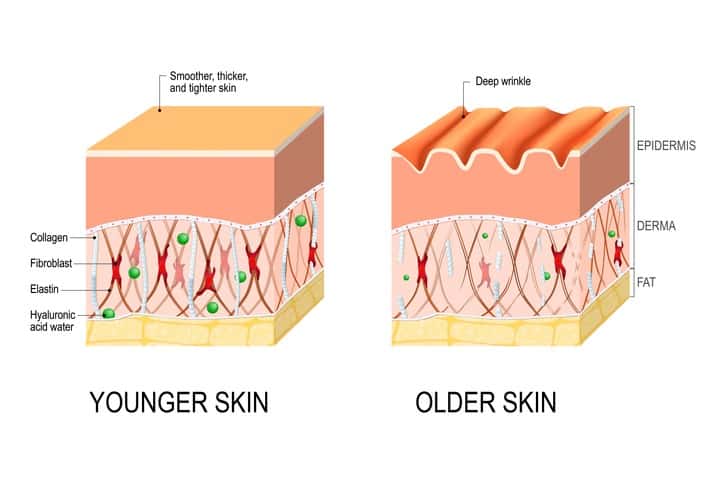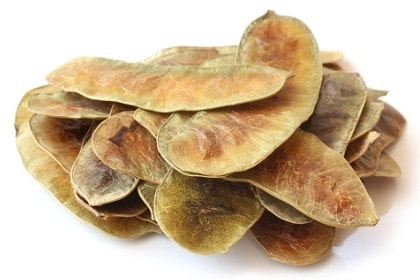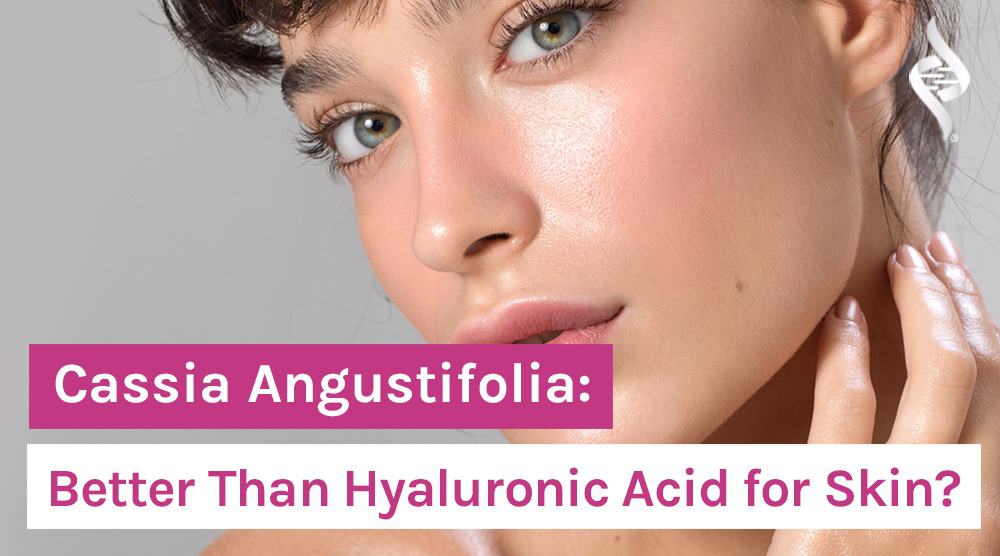Cassia Angustifolia: Better Than Hyaluronic Acid for Skin?
In a hurry? Click here to read the Article Summary...
Nothing beats the substances and mechanisms that exist naturally in your own body for creating health and vitality. That being said, the next best thing is substances found in nature, such as phytonutrient-rich foods, herbs, and spices, that can support your body in similar ways. This is the case with Cassia angustifolia (aka senna) and skin health.
According to many experts, senna’s ability to mimic naturally occurring hyaluronic acid is safer and outperforms synthetically produced hyaluronic acid. That means it can be an amazing addition to your skincare routine, either solo or as a key ingredient in a quality skin-enhancing serum.
What Is Hyaluronic Acid?
Hyaluronic acid is a substance that the body produces which acts like a lubricant and a “moisture capturer.” It has a cushion-like effect between tissues and is found in the highest quantities in the joints and eyes. Research indicates that hyaluronic acid may play an important role in wound-healing as well [1].

Hyaluronic acid is also vital for the health of your skin since it is the molecular substance that helps skin retain moisture. High water content is what makes your skin resilient and pliable. Hyaluronic acid functions in the various layers of skin in different ways. It all adds up to one thing, however – giving your skin that plump glow of youth by helping it retain water [2].
Hyaluronic Acid Depletes As We Age
Just like collagen (another substance vital for skin health), hyaluronic acid gets depleted through external stressors such as:
- too much sun exposure
- environmental pollution
It also responds to internal stressors such as:
- unhealthy eating habits
- lack of sleep
The simple process of aging also has a detrimental effect on hyaluronic acid levels as time goes by.
The authors of a 2012 report for the journal Dermato Endocrinology describe how the process of on-going exposure to stressors as we age affect the skin’s important ability to retain water through hyaluronic acid [3]:
“Skin aging is a multifactorial process consisting of two distinct and independent mechanisms: intrinsic and extrinsic aging. Youthful skin retains its turgor, resilience and pliability, among others, due to its high content of water. Daily external injury, in addition to the normal process of aging, causes loss of moisture. The key molecule involved in skin moisture is hyaluronic acid (HA) that has unique capacity in retaining water.”

Externally Produced Hyaluronic Acid Sources: What You Need to Know
When our bodies lack hyaluronic acid or it is low, skin can become dry, dull-looking, saggy, and prone to skin infection and blemishes. It makes sense then that we would seek out external sources of hyaluronic acid directly, although this may not be optimal for everyone.
Most commercial moisturizers and other face lotions contain externally produced or harvested sources of hyaluronic acid, sometimes from questionable sources. For the most part, external hyaluronic acid is obtained in one of two ways:

- It can be extracted from animals – rooster comb or cows’ eyes, in particular.
- It can also be created artificially in the laboratory by harvesting it from Streptococcus bacteria typically grown on wheat grains [4].
Some people call externally obtained hyaluronic acid a “fountain of youth” since it is able to mimic internally produced hyaluronic acid enough to help the skin retain water.
Indeed, externally produced hyaluronic acid is used commonly in the conventional setting for joint and eye conditions. It is also used for skin conditions, such as for cases of severe, acute dermatitis [5] as well as in many skincare products aimed at combatting signs of aging.
Many people prefer not to use externally produced forms of hyaluronic acid for a variety of reasons. For example, vegans or people concerned about toxicity over the long term.
How the EWG Rates Hyaluronic Acid’s Safety
The much-respected consumer safety organization Environmental Working Group (EWG) gives hyaluronic acid an overall toxicity rating of “fair.” They cite data gaps in research as well as some studies that may indicate the potential for toxicity as the basis for their rating [6].
As with so many other substances that are put in commercial skincare products, very little research has been done on hyaluronic acid. Therefore, we can only speculate as to its safety overall. We can, however, use common sense.
GMO & Antibiotics Are a Concern

Commercial poultry operations and beef feedlots themselves are sadly some of the most toxic environments on the planet. The majority of commercial operations give the animals feed made from GMO-derived corn and soy [7]. In addition, the majority of antibiotics used in the United States – 80% according to recent reports – go to animals used in commercial meat production [8].
Externally derived hyaluronic acid may also contain a yet-unknown potential for toxicity. Think of it this way. Do you really want to put something on your face that was extracted from GMO-raised, heavily medicated animals or grown using one of the most insidiously pathogenic bacteria on earth?
By the way, Streptococci bacteria is responsible for many conditions including strep throat, scarlet fever, inflammation of the kidney, rheumatic fever, impetigo, and cellulitis [9-11].
A Plant-based Alternative to Hyaluronic Acid
Luckily, there is another way. If you’re someone who appreciates plant-based natural alternatives, then you should know about Cassia angustifolia, otherwise known as senna plant. In fact, using Cassia angustifolia seed polysaccharide may yield a better result for your skin health overall.
Cassia Angustifolia Seed Polysaccharide: Amazing Natural Substance for Skin!
Many individuals swear by facial beauty products that contain senna, or Cassia angustifolia – and for good reason.
Senna is originally from Africa and Arabia, although it is now grown all over the world. It has been used for thousands of years for its diuretic effects and especially as a curative for constipation. In modern times, it was discovered that it could also be used as a powerful beauty aid for the skin [12].
Senna’s molecular structure is very similar to hyaluronic acid. This means that it also has the ability to retain water. Senna seed polysaccharides, a natural ingredient in most quality, organic skincare products such as Organixx Skin Restore Vitamin C Serum, has two great effects:
- It creates a barrier on the skin which locks in moisture.
- It also “binds” water to it.

Some experts claim that senna seed can hold up to 100 times its weight in water! A comprehensive 2006 evaluation of Cassia angustifolia seed published in the journal Pharmaceutical Biology confirmed the water-soluble nature of the polysaccharides in the seeds as well as its ability to retain water [13].
Senna is also a powerful antibacterial/antifungal that may be able to help with skin infections. A 2016 report published in the Journal of Pharmacognosy and Phytotherapy stated that Cassia Angustifolia extract “possesses remarkable antimicrobial activity and could act as an antifungal agent [14].”
How Cassia Angustifolia Seed Polysaccharides and Vitamin C Work Together
Cassia angustifolia seed polysaccharides draw moisture to the surface and keep it there for vibrant-looking skin. Vitamin C is the other side of this “dynamic duo.” The C is absolutely vital for the production of collagen in the dermis level.
Likewise, collagen is absolutely essential for skin cell renewal and repair. It is, in fact, what the skin is made up of in large part. It also plays a role in keeping skin soft, firm, and hydrated since it works together with hyaluronic acid to maintain a moist environment.
Skin hydration is important not just for beauty but for the integrity of the skin at a very basic level. Collagen requires a moist environment to stretch. When conditions are too dry, collagen strands will break and new tissue cannot form nor be repaired [15].
Organixx Skin Restore Vitamin C Serum with Cassia Angustifolia
Super-absorbable and high-antioxidant vitamin C is the key ingredient in Organixx Skin Restore Vitamin C Serum. Other 100% organic ingredients included in our unique formula are just as vital, however.
Besides Cassia angustifolia seed polysaccharides, other healing substances in Restore include natural aloe, vitamin E, kelp, Matrixyl® 3000 (a powerful peptide promoter), and MSM. Each ingredient lends its “unique talents” to the mix. Most importantly, they all contribute to a synergistic effect that can lead to beautiful, glowing, moisture-locked skin!
Discover Restore Vitamin C Serum… the most scientifically advanced topical vitamin C on earth, designed to keep your skin youthful, radiant, and healthy for the long term!

 Sources:
Sources:
Article Summary
Hyaluronic acid is a substance produced by the body which acts like a lubricant and a “moisture capturer.”
When our bodies lack hyaluronic acid, skin can become dry, dull-looking, saggy, and prone to skin infection and blemishes.
Externally produced hyaluronic acid is used for joint and eye conditions, skin conditions, and in many skincare products aimed at combatting signs of aging.
Most commercial moisturizers and other face lotions contain externally produced or harvested sources of hyaluronic acid, sometimes from questionable sources. External hyaluronic acid is often:
- Extracted from animals – rooster comb or cows’ eyes, in particular.
- Created artificially in the laboratory by harvesting it from Streptococcus bacteria typically grown on wheat grains.
Cassia Angustifolia (aka Senna) is a plant-based alternative to hyaluronic acid that many experts believe is safer and outperforms synthetically produced hyaluronic acid.
Senna seed polysaccharides, a natural ingredient in most quality, organic skincare products such as Organixx Skin Restore Vitamin C Serum, has two great effects:
- It creates a barrier on the skin which locks in moisture.
- It also “binds” water to it.




if cassia is the operative ingredient, why not offer that in powder form to add to smoothies or tea? Similar to the collagen products that are dissolvable to take externally
You must consider the laxative affect of Senna. Taken internally many people experience cramping and loose bowels....not something I would want in a smoothy. Long term use creates a dependency on it for elimination. I vote we see what happens externally when Cassia applied topically.
What a wonderful suggestion, Cate. Thank you so much. We will definitely take that into consideration. If we have plans to do that in the future, it will be announced and added to our website, https://ox2022.organixx.com/. You can also be notified via email by signing up for our newsletter here: https://ox2022.organixx.com/free-health-newsletter/.
In the meantime, we're excited to inform you that Cassia Angustifolia is one of the ingredients in our very own Organixx Skin Restore Vitamin C Serum.
Super-absorbable and high-antioxidant vitamin C is the key ingredient. Other 100% organic ingredients included in our unique formula are just as vital.
Besides Cassia Angustifolia seed polysaccharides, other healing substances in Skin Restore include natural aloe, vitamin E, kelp, Matrixyl® 3000 (a powerful peptide promoter), and MSM. Each ingredient lends its “unique talents” to the mix. Most importantly, they all contribute to a synergistic effect that can lead to beautiful, glowing, moisture-locked skin!
If you would like to learn more, feel free to check out the following links below:
https://shop.organixx.com/products/restore-vitamin-c-serum
https://ox2022.organixx.com/skin-restore
Thank you so much for being here with us. We hope you have a wonderful day!
correction; to take internally, thanks!